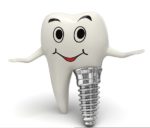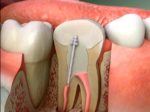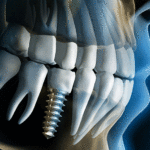Table of Contents
Teeth are there for our important day-to-day bodily functions, like talking, eating, and chewing. Your teeth are prone to damage either through injury or infection. Although this is not rare, everyone deserves to have healthy and natural-looking teeth.
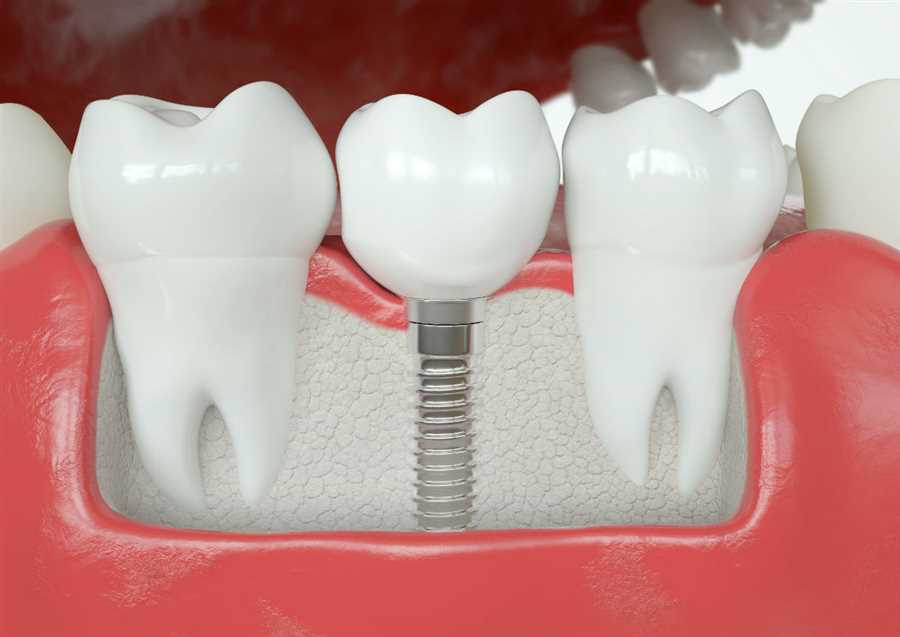
In this article, we specialize in dentures and dental implants. How are dentures different from dental implants? Which is better? Or which might help you more?
This is what we’ll answer today. So keep reading!
Replacing and addressing missing teeth are very important to your long-term health

You might think it is simply an aesthetic problem. But ignoring your dental problem can lead to several health problems. Around 120 million American citizens are missing one tooth or more, but that does not mean it should be ignored. And this is why:
Having a tooth missing does not only affect your oral functions. It affects the jawbone. The jawbone is the foundation for your teeth. It supports it and keeps it all together. But once you’ve lost a tooth, the jawbone begins to deteriorate. It can even atrophy and weaken. Yes, this can happen even if it’s just one missing tooth. When the jawbone goes into this weakening state, we call this resorption and will make your cheeks look hollow.
Beware: you can’t come back from bone loss. And resorption is not easy to reverse.
Aside from resorption, missing teach can cause the following:
- Difficulty in body functions such as speaking and eating
- Misalignment or moving of adjacent teeth
- Difficulty in regular home dental care
- Proneness to further tooth decay, loss, and gum diseases
- Weakening of remaining teeth can lead to chipping or cracking
In summary, we advise you to replace your missing teeth immediately.
Now you know the urgency of replacing your teeth. We have options, dentures and dental implants, but which will help you more?
Dentures
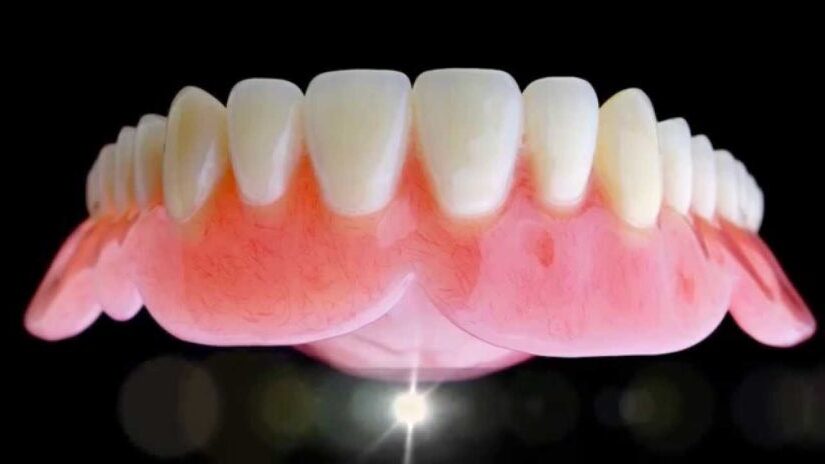
Dentures, essentially, are dental prosthetics that will protect your hard and soft parts of the gums that used to hold your missing teeth.
There are two kinds of dentures: Complete Dentures and Partial Dentures.
Complete dentures or all on 4 dental implants are much more appropriate if you have several or even many missing teeth. Partial dentures or traditional dental implants are better if much of your natural teeth are still intact. Conventionally, dentures can be removed, but dental implants can be implanted as a non-removable option. We’ll tell you more about this later.
Advantages of dentures:
- Will be customized for your jaw
- Are very natural-looking
- Use high-quality materials
- Allow you to speak and chew normally
Dental Implants
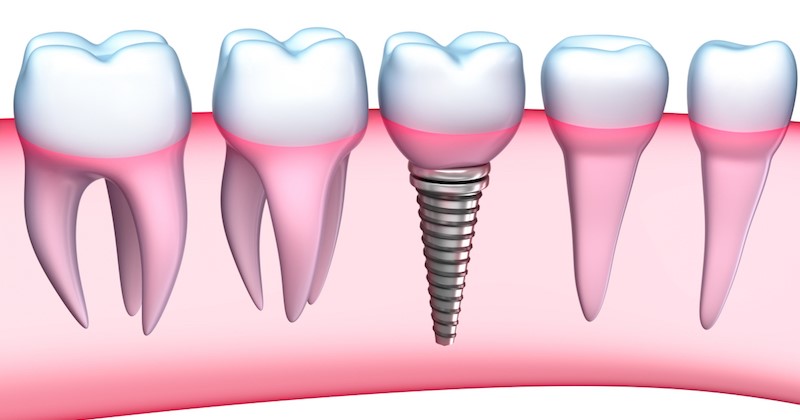
These are a good alternative to dentures. They have become the gold standard for replacing your missing teeth.
Unlike dentures, though, dental implants have to be surgically implanted. They are secured to your jaw in the same way that your natural teeth were attached. You will need time for this to heal, and will later be assisted by restorations. These restorations are:
- A permanent denture (which may be partial or complete)
- Bridge Pieces, which help with multiple teeth
- Dental crowns
With dental implants, you won’t be able to tell that you lost any teeth in the first place!
Advantages of dental implants:
- Are long-lasting and durable
- Look beautiful and natural
- Help you speak and eat normally
- Restore your jawbone strength
- Bring your gums back to top health
- And are made from titanium that is safe and biocompatible
So now let’s answer the big question…
Should I choose dentures? Or implants?
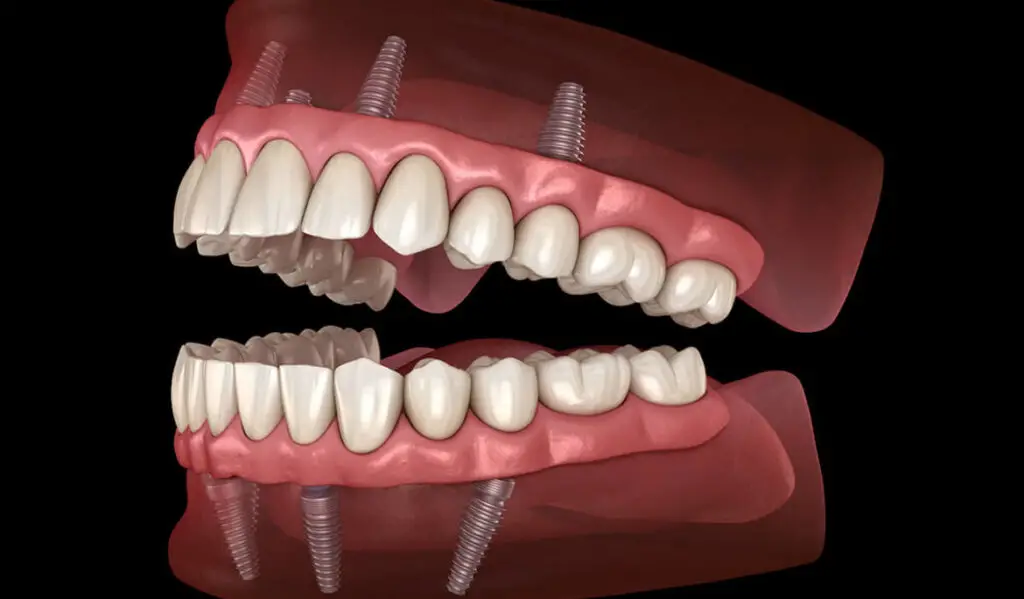
The first thing you can do is consult your dentist because they’re likely to have a good recommendation, especially if they are familiar with your dental history, situation, and health. This is especially true if you have missing teeth.
There may be instances, though, when your dentist will not have a preference. This will leave the decision to you. Your dentist will likely help you find more options but is ultimately up to you to weigh the pros and cons. So here are our tips for you:
You might want to choose dentures if:
- You’re on a budget
- You need a quick solution (up to 6 weeks wait time)
- Your gums or jaw is already weak and may not be viable for implants
Remember, though, that dentures need daily cleaning and fit you perfectly. Otherwise, they might weaken your jaw further. You can consult your dentist about this. Also, keep in mind that dentures will take time for you to adjust to. During the adjustment time, you’ll relearn how to eat and talk with them on. You will also need to replace dentures in a few years.
You might prefer dental implants if:
- You don’t have time for regular maintenance, cleaning, or replacing
- You are looking for a lasting solution
- You prefer the feeling of having your natural teeth back
- You prefer a tooth replacement rather than the appearance of teeth
However, dental implants are definitely more expensive than dentures in the beginning, although they do last longer. Dentures need maintenance and regularly replacing, which may cost more money in the long run. Dental implants also take longer to implement. The whole process, from you first to final procedure, could take anywhere from 3 to 9 months. Implants are also invasive and require surgery, which may be uncomfortable for you.
We hope that this info and tips are useful, and will help you make the best decision when it comes to addressing your missing teeth problem. Remember to always consult your dentist. Keep in mind that either option is safe, high quality, and created from advanced technology.
